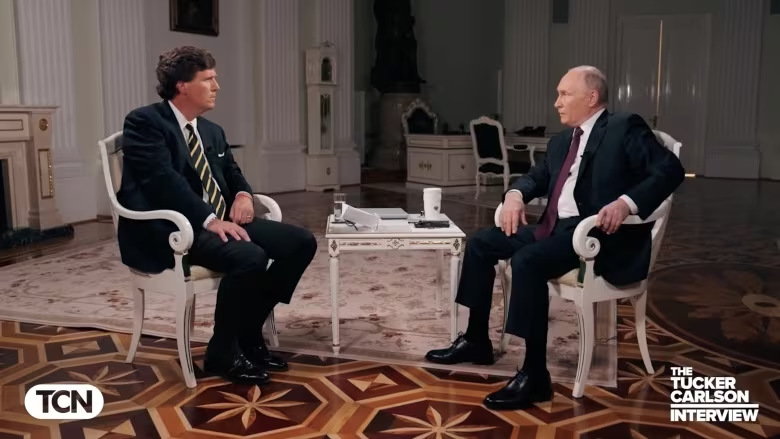
Russian President Vladimir Putin engaged in a conversation with American media figure Tucker Carlson during an interview held in Moscow on Tuesday. The interview was later published on Carlson's Tucker Carlson Network website on Thursday evening. (Image source: Tucker Carlson Network/Reuters)
In a recent interview with U.S. media personality Tucker Carlson, Russian President Vladimir Putin aimed Ukrainian President Volodymyr Zelenskyy over a contentious incident that unfolded during Zelenskyy's visit to Canada. The event in question occurred during Zelenskyy's address to the Canadian Parliament, where the assembly applauded a veteran with a controversial past.
Yaroslav Hunka, a Ukrainian Canadian recognized by then-Speaker of the House Anthony Rota, was praised for his role in fighting during the Second World War. However, subsequent media reports revealed that Hunka had been associated with a unit under Nazi command.
During his interview with Carlson, Putin seized upon this incident, expressing doubt that Zelenskyy and the Canadian Parliament would honour a figure with such a contentious history. The Russian leader framed the incident within his ongoing narrative of "de-Nazifying" Ukraine, a justification he has used to support his actions in the region.
While historians note the complexities surrounding individuals' motivations for joining such units during wartime, the episode proved to be a diplomatic embarrassment for Canada and added fuel to the geopolitical tensions in the region.
Putin's remarks during the interview, which touched upon various aspects of Russia's relations with neighbouring countries and the West, underscored his ongoing efforts to shape the narrative surrounding the conflict in Ukraine. Additionally, Putin hinted at the possibility of a prisoner exchange involving an American journalist currently detained in Russia, suggesting a potential diplomatic manoeuvre amid the broader geopolitical landscape.
As tensions persist and geopolitical dynamics continue to evolve, the interview provided insight into Putin's perspectives and tactics in the ongoing conflict.















